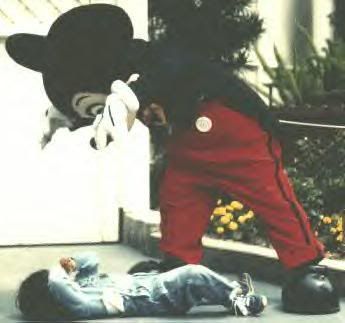
this is some hard stuff, and by "hard" i mean Hard Like the Marquis de Sade Is Hard. do not read this if you cannot stomach graphic depictions of animal torture. do not read this if you cannot stomach the murder of children. this one was hard for me to read at times, and i read some pretty terrible things.
but this is actually not a bleak book. perhaps because of the narrator: young Frank is a sadistic creature but his perspective is often self-deprecatingly wry or amusingly pedantic. he may be an affectless sociopath who channels his monstrous emotions into bizarre rituals and vicious traps, but hey - he is also a sensitively-wrought kid with many problems. what makes the book such a unique affair is the tension between the horrors illustrated and the traditional vehicle in which they are expressed: it is in many ways a kind of Young Adult novel, albeit one chock-full of grotesquerie. one in which the protagonist struggles to move beyond his outsider status, to connect with others, to understand his distant father and his, er, 'problematic' older brother. Frank's cruelties exist side-by-side with a cold-blooded version of typical teenage angst, angst that is built around familial relations, gender, and simply finding a place in the world. the ending resolves some truly dreadful plotlines in a truly dreadful manner, but also parallels the typically transformative Young Adult ending in which the hero comes to understand himself and so is able to move forward with his life. clever, Banks, very clever!
the narrative is designed as a chinese box of layered (and revolting) mysteries, but it is also designed as a more subtle trap for the unsuspecting reader: look at you, you just found some sympathy for a remorseless little psycho! the personal problems that he has to struggle with ARE pretty heavy for a kid to deal with, right? and you felt a bit of happiness at his eventual self-discovery, didn't you? well, you should be ashamed, sicko!
the writing is clean, clear, precise and the tone is surprisingly upbeat. the protagonist's thoughts have a quiet yearning and naiveté to them that makes even his most horrific plans and rationalizations seem almost understated, almost innocent. the deadpan humor also relieves some of the viciousness of the very dark activities portrayed. the dissection of gender was fascinating! and the use of the wasp factory itself moves beyond that of a torture maze, becoming a metaphor and a parallel for the fates of each of the characters. overall, a disturbing but very enriching experience.
this is a pretty unique book. if you like it, you may want to search out jack vance's Bad Ronald, which is also dryly and ironically concerned with the deadly fantasy life of a youthful, psychotic outsider.

No comments:
Post a Comment